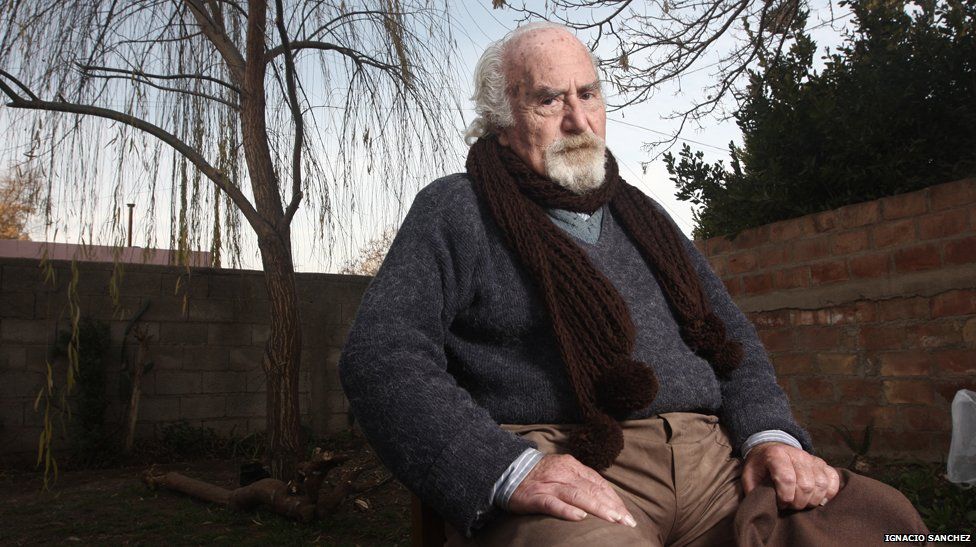Puccio crime clan continues to intrigue Argentina
- Published

The story of the Puccio family, whose members abducted wealthy Argentines for ransom and hid them in their house before killing them, is making headlines again, 30 years after their convictions. Irene Caselli reports from Buenos Aires.
It was 1985 and Argentina was coming to grips with its newly restored democracy.
Secrets were slowly emerging after seven years of military rule during which as many as 30,000 people had been forcibly disappeared.
But the story of one family shocked the country.
Unlikely criminals
On the face of it, the Puccios seemed like an unlikely crime clan.
They lived in the wealthy suburb of San Isidro, north of Buenos Aires.
Their house was only two blocks from the cathedral and they attended mass every Sunday.
One of the sons was a famous rugby player.
So the discovery during a police raid in August 1985 of businesswoman Nelida Bollini de Prado in the Puccios' cellar was met with disbelief.
Ms Bollini de Prado had been kidnapped a month before.
Rodolfo Palacios, author of a biography of the Puccio clan, said that initially many of the Puccios' neighbours came out in their defence, refusing to believe the accusations.
"The story remains full of mystery. We still don't know what really happened inside the house," he told the BBC.
What is known is that between 1982 and 1985, Arquimedes Puccio, with the help of two of his sons and three acquaintances, kidnapped four people and killed three of them.
Dark past
It is believed that Mr Puccio helped the secret service kidnap people during the dictatorship, when tens of thousands of those suspected of opposing the military were abducted.
He eventually started to work independently, choosing wealthy victims to kidnap for ransom.
Rugby player Ricardo Manoukian and engineer Eduardo Aulet were killed after their families had paid up.
Businessman Emilio Naum died in a struggle with members of the clan as they were trying to abduct him.
Businesswoman Bollini de Prado was the only one who survived after police grew suspicious and raided the Puccio home.
Mystery
Thirty years since Arquimedes Puccio was sentenced to life in prison, a film called The Clan has become a box office hit, with more than 1.5 million viewers in the two weeks following its release in Argentina.
"It's a seemingly normal family that is completely outside the norm," the film's director, Pablo Trapero, told the BBC.
The film focuses on life inside the Puccio house, especially on the bond between Arquimedes and his son Alejandro.
Alejandro, who at the time of the kidnappings was in his early 20s, is the eldest of the five Puccio children.
A successful rugby player, he was something of a celebrity in San Isidro.
The first victim, Ricardo Manoukian, was a teammate of his.
In the film, Alejandro is portrayed as a young man who does not dare confront his father and who remains tormented by his choices.
Hard to recreate
With many of the family members now dead or not speaking publicly, recreating what happened was no easy task.
Arquimedes Puccio died two years ago of a stroke.
Like his father, Alejandro was sentenced to life in prison. He died of pneumonia in 2008 while on parole.
The whereabouts of Daniel, who was also convicted but only served a few years in prison, are unknown.
The third son, Guillermo, left Argentina in the early 1980s, never to return.
Silvia, the second eldest child and a local art teacher, died of cancer in 2011.
The fifth and youngest of the children, Adriana, was a teenager when her father and two brothers were arrested.
She and her mother, Epifania Calvo, are alive and still own the house where the family lived and the kidnap victims were held.
Ms Calvo, her daughters and Guillermo were never charged, even though many questioned how they could have been unaware of what was happening in their own home.
Documentary evidence
Film director Trapero says he did his best to recreate the family relations through "photographs, letters, interviews with friends of Alejandro's, or people who had visited the house and lived in the neighbourhood".
Screenwriter and director Luis Ortega, who is behind a soon-to-be-released TV series about the Puccios, encountered the same problem as Mr Trapero. He also decided to concentrated on the family dynamics.
"There are some who know, some who don't know, some who enjoy what they're doing, some who enjoy it but feel guilty," he says.
What Mr Ortega, Mr Trapero and Mr Palacios all agree on is that the Puccio case was only possible in the Argentine context of the 1980s.
"People didn't ask too many questions because it was better that way," says Mr Ortega of the years during and after the dictatorship.
"Arquimedes [Puccio] is not a crazy guy that decides to start kidnapping people out of the blue," says Mr Trapero.
"He slowly became who he was within the Argentine political context," he says. "He was a symptom of that time."
"I think the Puccio clan would not have been possible without the military dictatorship," says Mr Palacios.
"They ultimately used the same methods."